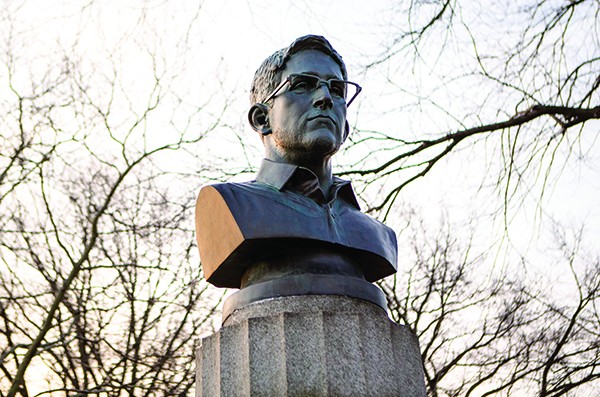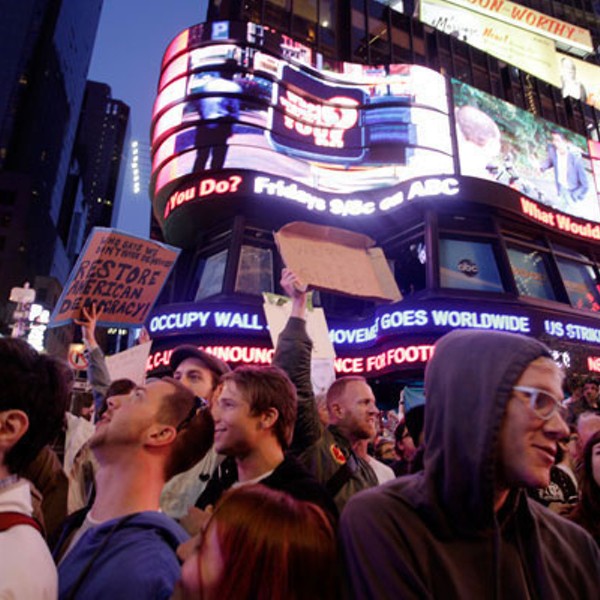Two artists and a helper fused a 100-pound bust of Edward Snowden onto the Prison Ship Martyrs Monument in Fort Greene Park in Brooklyn on April 6. The New York City-based artists first came up with the project about a year ago, called, appropriately, "Prison Ship Martyrs Monument 2.0." The bust was created by an anonymous, but renowned, sculptor on the West Coast, and the pair allowed Animal, a New York-based media outlet, to document the installation on the condition that their identities remained hidden. In a statement, the duo wrote that the project was intended to "bring a renewed vitality to the space and prompt even more visitors to ponder the sacrifices made for their freedoms." The Parks Department removed the sculpture the same day.
Source: Animal
Vassar College become the inaugural winner of a newly established $1 million prize by the Jack Kent Cooke Foundation of Northern Virginia for excelling in enrolling and graduating low-income students. About a quarter of Vassar students have family incomes low enough to qualify for federal Pell grants, which are strictly needbased for low-income undergraduate and some postbaccalaureate students. The New York Times created a College Access Index based on the number of freshman in 2011-13 who received such grants, as well as the net price of attendance for low- and middle-income families. Vassar topped the charts with an average $340,000 endowment per student, with a net price of $5,600 each.
Source: New York Times
Since drones have flown into the market, the Federal Aviation Administration has begun proposing flight regulations for the copter-like devices, though they have yet to prohibit flight over private property. A new company called NoFlyZone is compiling lists of homeowners who don't want drones flying over their property to be distributed to drone makers and users. While their adherence to these "no-fly" requests is still entirely voluntary, it allows the 71 percent of Americans polled by Reuters/Ipsos who don't think that drones should be able to operate over someone else's property to speak up. Since the website opened, more than 20,000 people have signed up and seven drone makers have started using the list.
Source: NPR
A powdered form of alcohol called "Palcohol" has been approved for sale in the United States by the US Alcohol and Tobacco Tax and Trade Bureau, and Colorado Gov. John Hickenlooper signed a law permitting the sale in Colorado. While the sale is officially legalized, a few states have already moved to ban the product, including New York and Rhode Island. The product has already been banned in South Carolina, Louisiana, and Vermont, and cannot be sold in Massachusetts because the state defines alcoholic beverages as liquid. The ease with which Palcohol can be transported and disguised, as well as the possible health risks of people snorting it, has lawmakers expressing concern. (The makers of Palcohol suggest against this painful and ineffective technique.) The company has approval to sell four flavors thus far: vodka, rum, Cosmopolitan, and "Powderita," which is margarita flavored.
Source: Livescience, NPR
An investigation conducted by the New York Times revealed that American and American-trained Iraqi troops repeatedly encountered chemical weapons from 2004 to 2011. The under secretary of the US Army apologized in March for the military's treatment of active and veteran soldiers exposed to chemical weapons in Iraq, announcing new steps to provide medical support and recognition to those who had been denied monetary awards in response to the investigation. Abandoned chemical munitions remained on the battlefields from the Iran-Iraq war in the 1980s, leaving soldiers vulnerable to exposure. The military expects to screen at least 1,500 active-duty troops or veterans. Of that population, 830 people had noted that they may have been exposed on their postdeployment health forms, 540 called a military exposure hotline, and the Times identified about 275 soldiers in their reporting that may have been exposed.
Source: New York Times
An Arizona law is in the works that would prevent police departments from releasing the names of police officers involved in the killing of a member of the public through the use of "deadly force" for 60 days. Already, the bill has been passed by the State Senate and is currently going through the House of Representatives. A few exceptions have been included in the verbiage, including the release of the officer's name by family members if they are also killed, if the officer is charged with a crime, or if the officer chooses to disclose his or her identity. The law is meant to protect officers from death threats following deadly incidents, though opponents claim the bill is decreasing the transparency of law enforcement. Originally, the State Senate approved a measure to keep officers' identities secret for 90 days following such an incident, but the time period was later reduced to 60 days.
Source: Guardian (US)
Gov. Andrew Cuomo has received more than $6 million in contributions from the New York City hedge fund community in support of cutting public school funding and the creation of charter schools. In his recent State of the State address, Cuomo proposed an education reform that would further decrease public school funding, making it possible for for-profits run by his hedge fund supporters to replace low-income public schools with privately owned charter schools. If fair-share taxes were instated, the $5.9 billion gap in legally mandated equitable funding for low-income public schools promised by Gov. Elliot Spitzer in 2007 could be completely repaid, according to Michael Kink of the Strong Economy For All Coalition. Instead, since 2000, 570 hedge fund managers and top executives have poured almost $40 million into the campaigns of politicians like Cuomo, who reinforce the gap in New York's public education funding.
Source: The Nation
A study conducted by Civic Economics and commissioned by Re>Think Local concluded that the Hudson Valley is benefiting from "going local." Local retailers circulate four times as much money back into the local economy compared to corporate chains. In addition, the "Indie Impact Study Series 2013-14: A National Survey" found that Hudson Valley restaurants circulate more than two-and-a-half times as much money as their corporate counterparts. The study concluded that if only 10 percent of the market shifted from chains to local businesses, an additional $475 million would remain in the regional economy.
Source: Re>Think Local
Compiled by Kelly Seiz

















